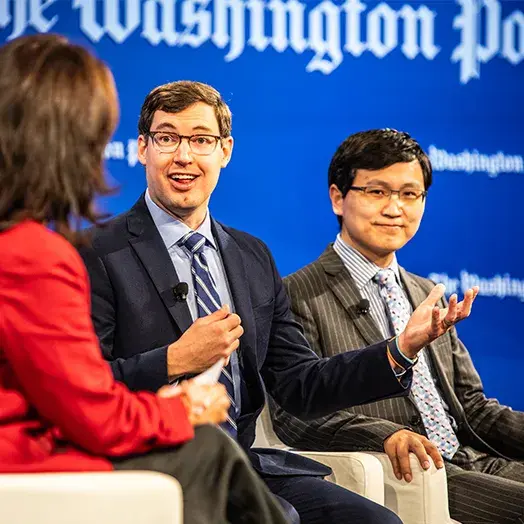Why do we like to be scared? Associate Professor Haiyang Yang, a behavioral scientist, explores the factors that drive decision-making and how they relate to choosing scary content.

Why do we enjoy horror? Science explains
Halloween is the season for celebrating the frightening and macabre. From blockbuster movies to scary novels to haunted house attractions, horror is big business. In fact, the demand for what scientists call “counterhedonic consumption”—seeking out experiences or products designed to evoke negative emotions—has surged in recent decades to become one of the most prevalent and profitable forms of entertainment.
So why do some people love to be scared? Science may hold the answers.
Associate Professor Haiyang Yang, a behavioral scientist at Johns Hopkins Carey Business School, explores the factors that drive decision-making. He and colleague Kuangjie Zhang of Nanyang Technological University Singapore have been looking into the reasons why some people can't wait to get scared.
Going to extremes
According to these researchers, stimulation is one of the driving forces behind the consumption of horror. Exposure to terrifying acts like stories of demonic possession or alien infestation can be stimulating both mentally and physically. These experiences can give rise to both negative feelings, such as fear or anxiety, and positive feelings, such as excitement or joy. And we tend to feel the most positive emotions when something makes us feel the most negative ones.
Horror entertainment can also provide a novel experience, like a zombie apocalypse, that doesn't necessarily happen in the real world. At the same time, horror entertainment is a safe way to satisfy a curiosity about the dark side of humanity through storylines and characters facing the darkest parts of the human condition.
Tricks aren't always treats
The question remains as to why some people get a kick out of horror while others do not. Research suggests that those who enjoy horror have a psychological “protective frame” that falls into three categories.
First is a safety frame. Watching a horror film or show means we have to know for sure that we are safe, and that the evil entity is distant and cannot hurt us. The second category of protective frame involves a sense of detachment. We need to be reminded that horror we are seeing is not real—it's just great acting, special effects, and art direction. Finally, the protective frame involves our sense of control and the confidence in managing the dangers we encounter. We can still get a thrill from a good scare if we feel confident about controlling and overcoming the perceived danger.
In order to savor the spooky, we don't have to have all three of these frames. But having fewer than all three tends to turn us off to the idea.
What to Read Next

student experience
Two MBA graduates make Poets & Quants Best and Brightest list for 2025
business of health
What does it take to lead the implementation of reliable AI in health care delivery?Not surprisingly, some research indicates that people with a higher sensation-seeking trait and those who are more open to new experiences tend to seek out and enjoy horror-related experiences more. Additionally, if you have more empathy, you tend to react more negatively to what happens in horror shows.
The wealth factor
Yang and Zhang analyzed movie box office data from 82 countries and discovered that individuals from countries with a higher GDP per capita watched more scary stuff. That wasn't true for genres like romance. Through additional studies, they found that people in countries with less wealth have fewer resources that help them feel they have control over their circumstances. That may degrade the sense of control required to enjoy horror.
“Our sense of control can serve as a form of psychological protective frame, a prerequisite to experiencing pleasure from horror consumption,” said Yang.
Sometimes understanding why we like the things that go bump in the night on Netflix is a little bit of a spoiler. But next time you reach for the remote, keep Yang's frames in mind. If you're not sure what you want to watch is fiction, or if you're feeling a little less than confident in your control, you might want to find a comedy show instead.
For more on Yang's research, take a peek at “The Psychology Behind Why We Love (or Hate) Horror” at Harvard Business Review.


